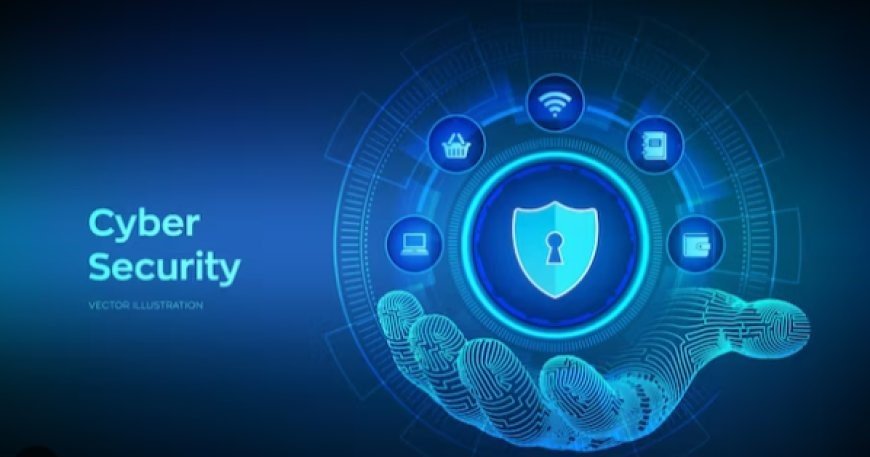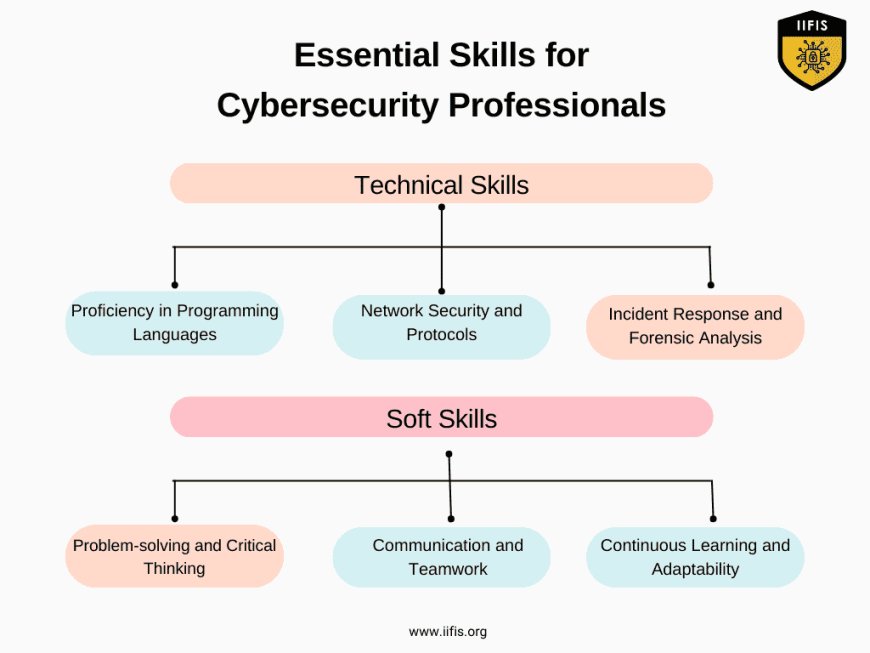Building a Career in Cyber Security: Essential Skills and Qualifications
Explore the vital skills and qualifications needed to forge a successful career in cyber security. Discover key insights to navigate this dynamic field effectively.

The importance of cybersecurity has increased significantly in the current digital field. With our lives increasingly intertwined with technology, the need to protect our digital presence has skyrocketed. Whether it's personal data, financial information, or critical infrastructure, cybersecurity is vital in keeping everything safe and secure.
As technology advances, so does the demand for skilled cybersecurity professionals. Organizations across the board are actively seeking individuals with the right expertise to safeguard their systems from cyber threats. Exciting employment prospects in cybersecurity are made possible by this increase in demand.
Cyber Security
In the present digital field, cybersecurity threats are on the rise, making it crucial for companies to prioritize protective measures. Cyberattacks and data breaches have become more frequent, posing serious risks to sensitive information. As a cybersecurity expert, it's essential to understand the current state of these threats.
Cybersecurity is now a top priority for companies and organizations. They have been compelled by the increase in cyberattacks to strengthen their defences and incorporate strong security measures. This is a need rather than a passing trend. Protecting sensitive data is important and cannot be emphasized enough.
Businesses nowadays are actively reducing risks and fortifying their security postures. In actuality, the threat field is always present, and companies must deal with it wisely. A thorough understanding of the details of current dangers is crucial for the field of cybersecurity in the future.
It's essential to remain watchful and always come up with new strategies for building defences if you want to succeed in the field of cybersecurity.
The cybersecurity dilemma is real, but by prioritizing protective measures, companies can deal with these challenges and keep their data safe. In a nutshell, understanding the current state of cybersecurity threats is pivotal for any organization aiming to protect its digital assets.
Obstacles in Cyber Security
1. Shortage of Skilled Cybersecurity Professionals: In the current digital field, there are three main challenges in the cybersecurity field. First off, there needs to be more skilled cybersecurity professionals. Think of it like needing more guards to protect a valuable treasure. The digital world is expanding, but we need more experts to keep it all safe.
2. Rapidly Evolving Nature of Cyber Threats: Secondly, cyber threats are always changing. It's like trying to defend a castle, but the invaders keep developing new tricks. Cyber threats evolve rapidly, making it crucial for cybersecurity professionals to stay on their toes.
3. Diversity of Cyber Threats Requiring a Broad Skill Set: There's a diversity of cyber threats. It's not just one type of enemy; it's like facing a bunch of different bad guys, each with its own way of attacking. This means that cybersecurity professionals need a broad skill set to tackle all these different challenges.
What skills does one need for a thriving career in cybersecurity? Which qualifications and certifications hold recognition in the industry? How can those aspiring in the field develop and effectively showcase their cybersecurity skills?
Essential Skills for Cybersecurity Professionals
Technical Skills
-
Proficiency in Programming Languages: Being comfortable with programming languages like Python and C is like having a trusty toolkit. It helps cybersecurity professionals write scripts, automate tasks, and dig into the nitty-gritty of security protocols.
-
Network Security and Protocols: Imagine a digital highway. Understanding network security is like being the traffic cop, ensuring that data travels safely. Professionals need to know how to safeguard networks, detect vulnerabilities, and keep an eye on data traffic.
-
Incident Response and Forensic Analysis: Picture as the cyber detective work. In the unfortunate event of a security breach, experts need to respond swiftly and analyze what happened. It's like CSI in the digital world, figuring out the who, what, and how.

Soft Skills
-
Problem-solving and Critical Thinking: Every day in cybersecurity is like solving puzzles. Having a knack for problem-solving and thinking critically is crucial. It's about being Sherlock Holmes – piecing together clues to understand and solve security issues.
-
Communication and Teamwork: Cybersecurity isn't a one-person job. Professionals need to communicate effectively with their team and sometimes with non-tech folks. It's like being a translator between the tech world and everyone else.
-
Continuous Learning and Adaptability: In this changing digital field, being adaptable and a perpetual learner is key. It's like staying updated with the latest gadgets – you need to know what's new to keep things secure.
Cybersecurity Tools and Technologies
Familiarity with Various Security Tools: Imagine your online fortress. Firewalls stand as the protective walls, determining who gets in and who stays out. They're like the gatekeepers of your digital kingdom. Intrusion Detection and Prevention Systems (IDS/IPS) act as vigilant sentinels, keeping an eye out for any unusual activity and swiftly taking action to prevent potential threats.
Endpoint Security Solutions: Now, let's focus on your devices – laptops, desktops, and mobile phones. Endpoint security solutions are like digital bodyguards for these devices. They protect against malware, phishing, and other cyber threats that might try to sneak in through the back door when you're not looking.
Security Information and Event Management (SIEM) Systems: In the digital field, it's essential to have a system that acts like a detective, constantly looking for clues and patterns. This is where SIEM systems come into play. They collect and analyze data from various sources to identify potential security incidents. It's like having your cyber detective, piecing together information to keep your digital space secure.
Qualifications and Certifications
Academic Degrees
1. Bachelor's and Master's degrees in Cybersecurity: When it comes to academic qualifications, you have a couple of paths to consider. First off, you can go for Bachelor's and Master's degrees specifically in Cybersecurity. These programs are designed to equip you with the knowledge and skills needed to tackle cyber challenges head-on.
2. Related degrees: But wait, don't fret if a dedicated Cybersecurity degree isn't on your radar. Degrees in Computer Science or Information Technology also fit the bill. They provide a solid foundation, and you can always tailor your learning towards cybersecurity as you go along.
Industry-Recognized Certifications
1. Certified Information Systems Security Professional (CISSP): This is like the heavyweight champion belt. It covers a broad range of cybersecurity topics, proving you're not just a one-trick pony.
2. Certified Ethical Hacker (CEH): Ever fancied being a good hacker? Well, here's your chance, the ethical way. CEH teaches you how to think like a hacker, but with good intentions – to protect.
3. CompTIA Security+: Think of this as your basic training. It covers fundamental cybersecurity skills and is a great starting point, especially if you're new to the field.
Practical Experience and Internships
1. Real-world application in internships: Picture this as an apprenticeship. You get to work on real projects, solve actual problems, and learn the ropes from experienced cybersecurity folks.
2. Building a practical portfolio: It's like a scrapbook, but for cybersecurity. Document your experiences, the problems you've solved, and how you tackled them. This becomes your show-and-tell when you're applying for jobs.
Developing and Showcasing Skills for a Cybersecurity Career
Hands-On Projects and Challenges
a. Setting up a Home Lab for Practical Experimentation: Think of your home lab as your little cybersecurity playground. It doesn't need to be fancy – just a computer and some software will do the trick. Experiment with setting up firewalls, testing out different security configurations, and getting hands-on with real-world scenarios. Remember, it's the hands-on experience that makes you stand out.
b. Participating in Capture the Flag (CTF) Competitions: No, we're not talking about outdoor games – in the cybersecurity world, CTF competitions are the real deal. These challenges simulate actual security scenarios, allowing you to showcase your problem-solving skills. Plus, they're loads of fun! There are online platforms offering CTFs where you can compete, learn, and sharpen your skills.
Networking and Community Involvement
a. Joining Cybersecurity Forums and Online Communities: Cybersecurity is all about collaboration. Joining forums like Reddit's cybersecurity community or platforms like Stack Exchange can open doors to a wealth of knowledge. Share your experiences, ask questions, and learn from others. It's like having a virtual water cooler where cybersecurity enthusiasts gather to swap stories and insights.
b. Attending Conferences and Meetups: You don't need a superhero cape to attend cybersecurity conferences – just an eagerness to learn. Look out for local meetups or virtual conferences where experts share their experiences. It's a fantastic opportunity to expand your network, learn about the latest trends, and maybe even score some free swag.
In wrapping up, remember that cybersecurity isn't just a buzzword—it's a vital shield in our digital lives. Aspiring professionals, step in! The cyber field needs your skills and dedication. Keep learning, stay curious, and adjust to the changing tech scene. It's not just a job; it's a journey where you safeguard digital fields. So, whether you're just starting or levelling up, continuous learning is your secret weapon. The importance of cybersecurity is real, and your role in it is significant. Join the league, accept the challenges, and let's make the digital world a safer place, one byte at a time.
























